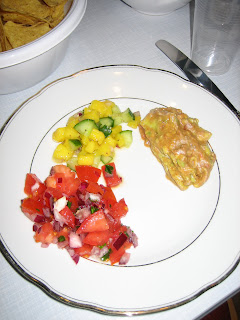The past few months, I’ve often wondered how I’d feel on my last day in Poland. I always knew I’d feel a deep sadness. I was very worried I’d spend my last days in denial – trying to protect myself from the grief of leaving.
What I didn’t expect was that I’d feel a wonderfully profound sense of gratitude and a magnificently overwhelming sense of joy. Gratitude for the people in my life around the world, gratitude for the experiences I have had, gratitude for the transformation I’ve experienced thanks to this journey. Joy in the experience of accompaniment and community, joy in teaching, joy in learning, joy in loving, joy in laughter, joy in giving, joy in receiving.
I never thought that if someone asked me to describe my last week in Poland that – although I’ve also cried every day and felt very sad – the words that most resonate with me are “love,” “joy,” “gratitude,” and “celebration.”
I’ve discovered that although goodbyes are sad because of the knowledge of parting, goodbyes are also a celebration of the fact that you had the opportunity to say “hello.” When saying goodbye, friends, students, colleagues, and I have shed many tears, but we also can't help but talk about our joy – joy that we had the opportunity to meet, to become a part of each other's lives. And in the goodbye we celebrate and rejoice in the love, respect, and affection we share. It’s a wonderful gift to be given the opportunity to stop and acknowledge how people in your life have changed you, helped you grow, supported you, challenged you, loved you. Maybe we should say goodbyes more often. It is at the time of goodbye that we speak the words in our hearts – we tell people we love them, how grateful we are for them, what they mean to us, how they hold us up. We hold them a little tighter, savor the togetherness a little longer. And in every goodbye is the beautiful hope of one day meeting again.
I return to Chicago not only with my (potentionally overweight) suitcases, but with a full heart. I keep thinking of Luke 2:19: “But Mary treasured up all these things and pondered them in her heart.” I think of all the words, the embraces, laughter, hugs, the smiles I have treasured up these past two years. I travel with a heart filled with affirming, loving words from students, friends, family, and colleagues. I know I will always remember them, ponder them. And they are joyful things to forever carry in my heart.
I end this journey with a joyous heart, a hopeful heart. I know that the upcoming months will have times of great joy and happiness and times of great sadness and difficulty. At the end of this journey it’s amazing to feel this intense sense of gratitude, this intense sense of joy, this intense feeling of love, this intense feeling of peace, this intense feeling of hope, this intense feeling of anticipation. Thanks be to God for the gift of feeling alive! To know that there is so much love and joy to be found in this world, to be given in the world, to be received in this world, to be shared in this world!
May the God of hope fill you with all joy and peace as you trust in Him, so that you may overflow with hope by the power of the Holy Spirit. Romans 15:13
Thanks be to God, for the gift of these two years, for this journey, for the hidden gifts of joy and gratitude found even in difficult goodbyes, for peace, for the multitude of blessings in my life, for the promise of hope and joy in new beginnings.
You have filled my heart with greater joy than when their grain and new wine abound. Psalm 4:7.
Today, with great joy and gratitude for all that has been, and with great hope and excitement for all that will be, I sign off this blog.
Rejoice in the Lord always. I will say it again: Rejoice! Philippians 4:4.













































